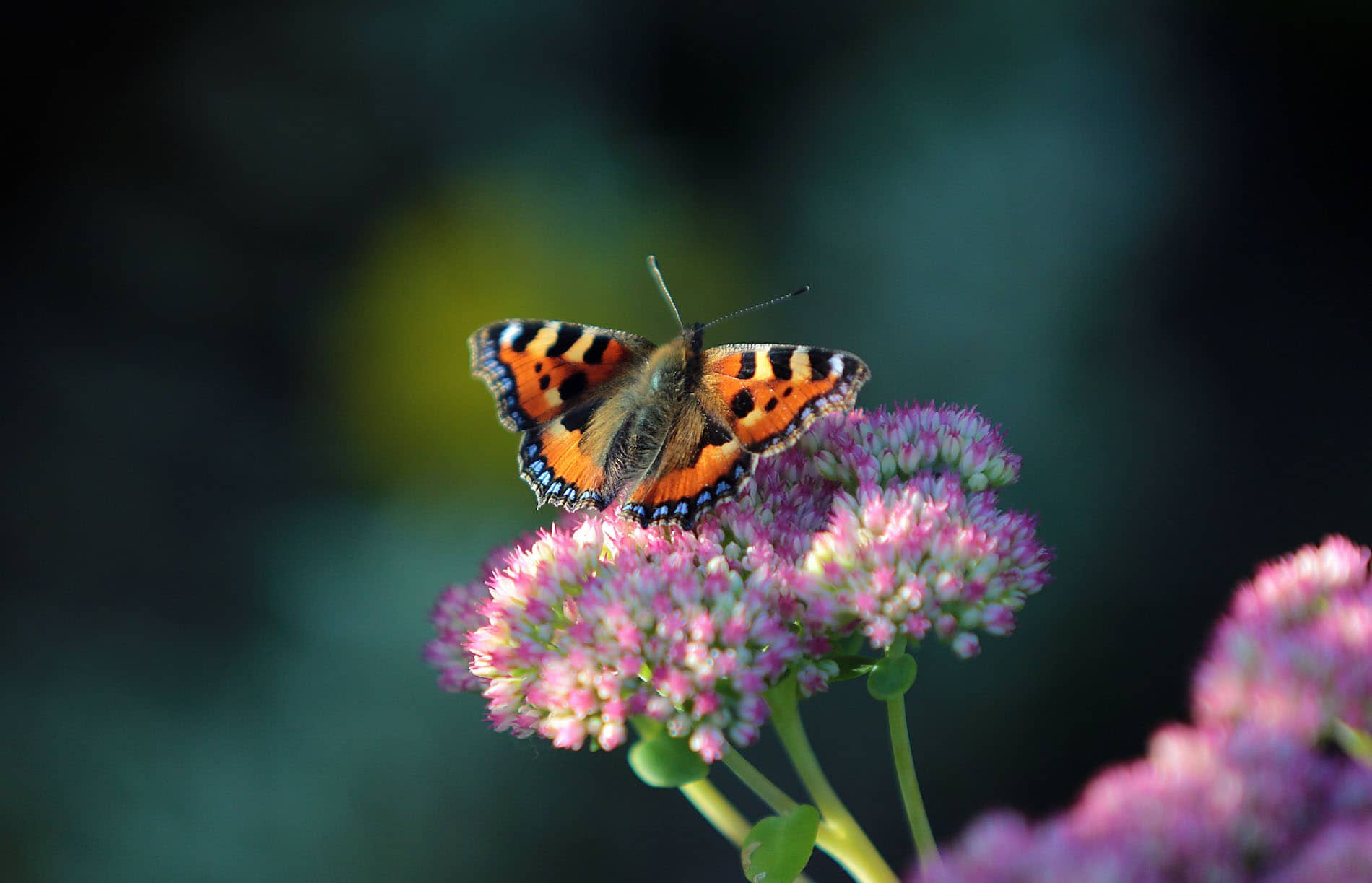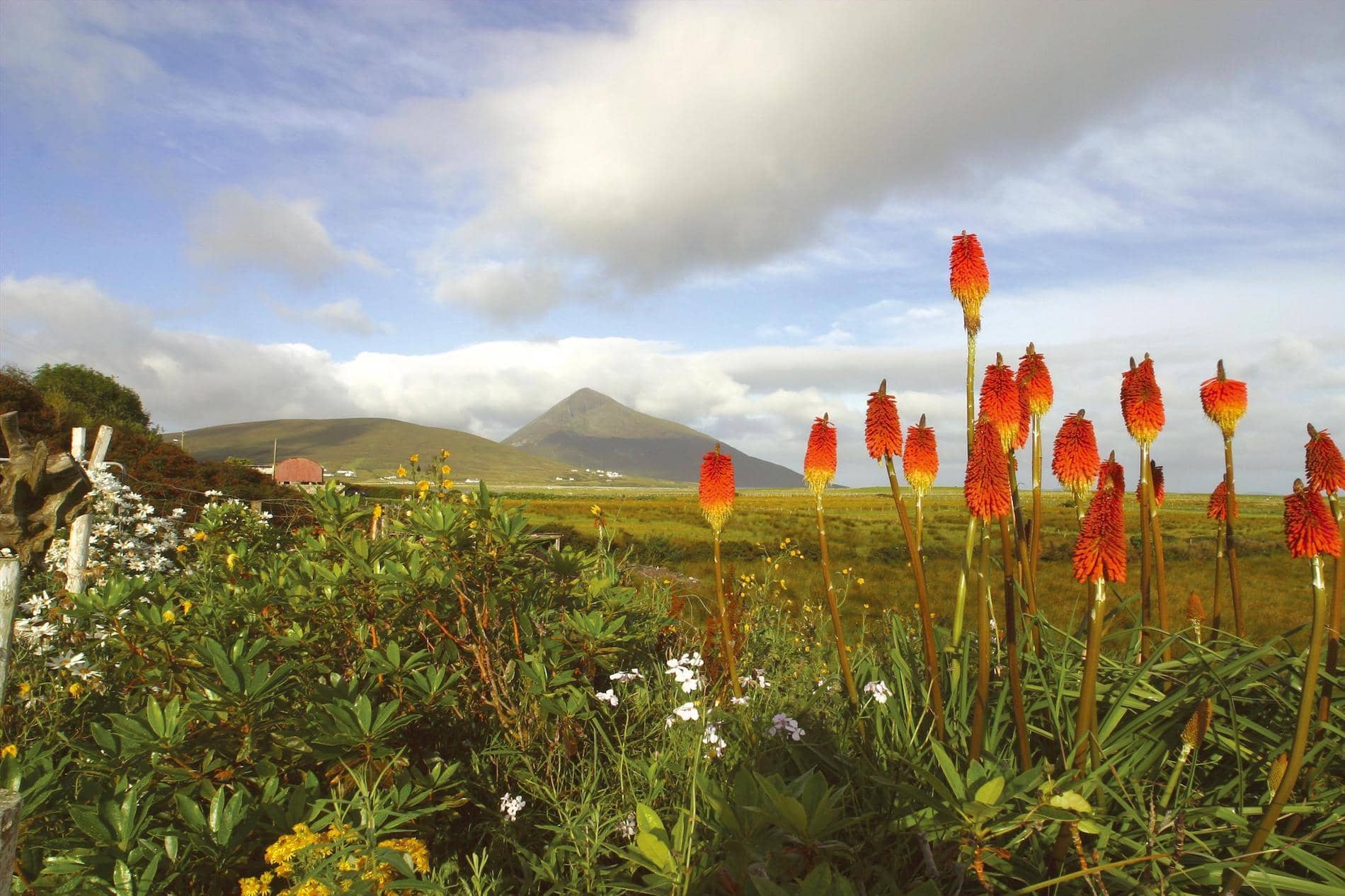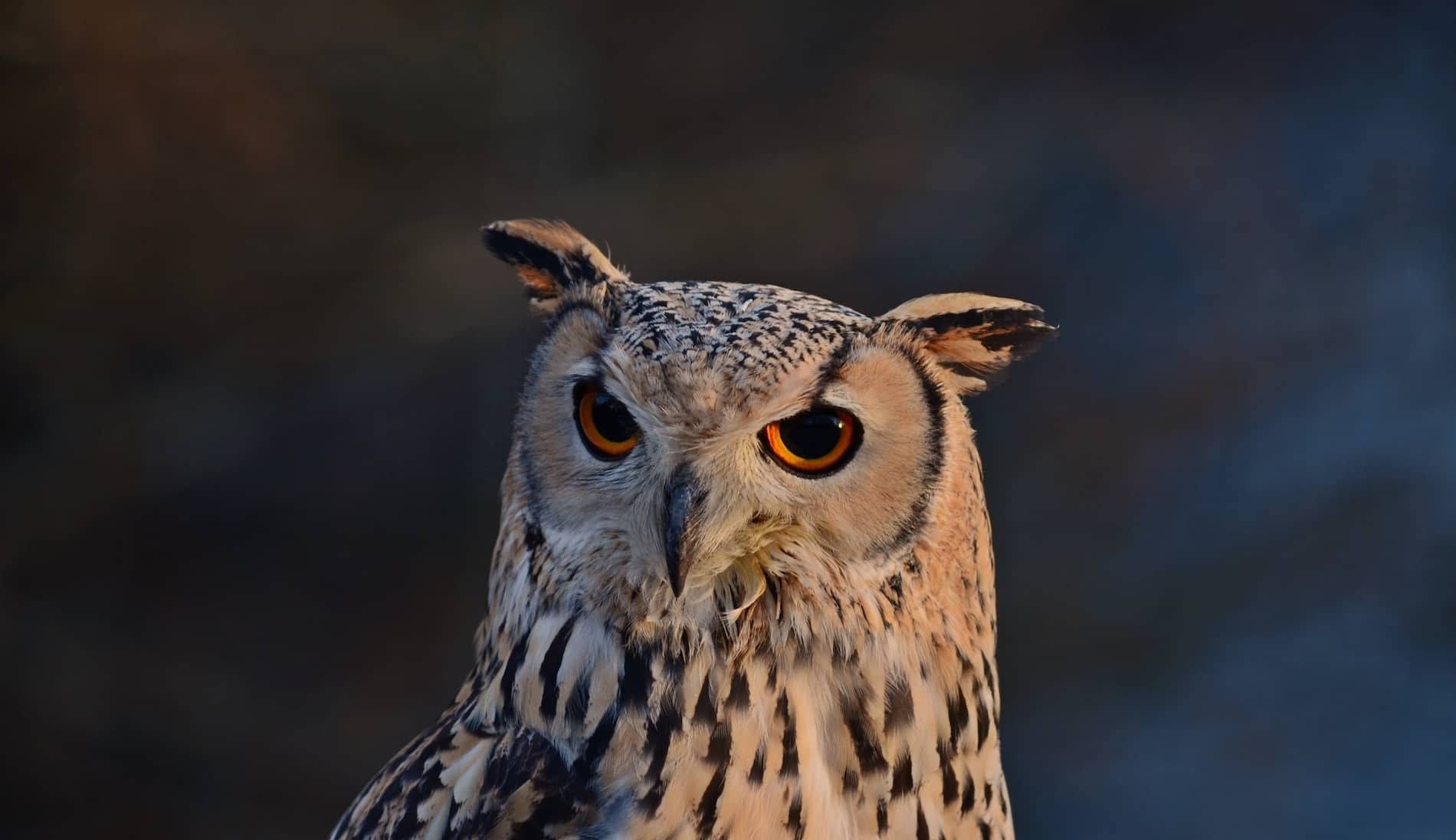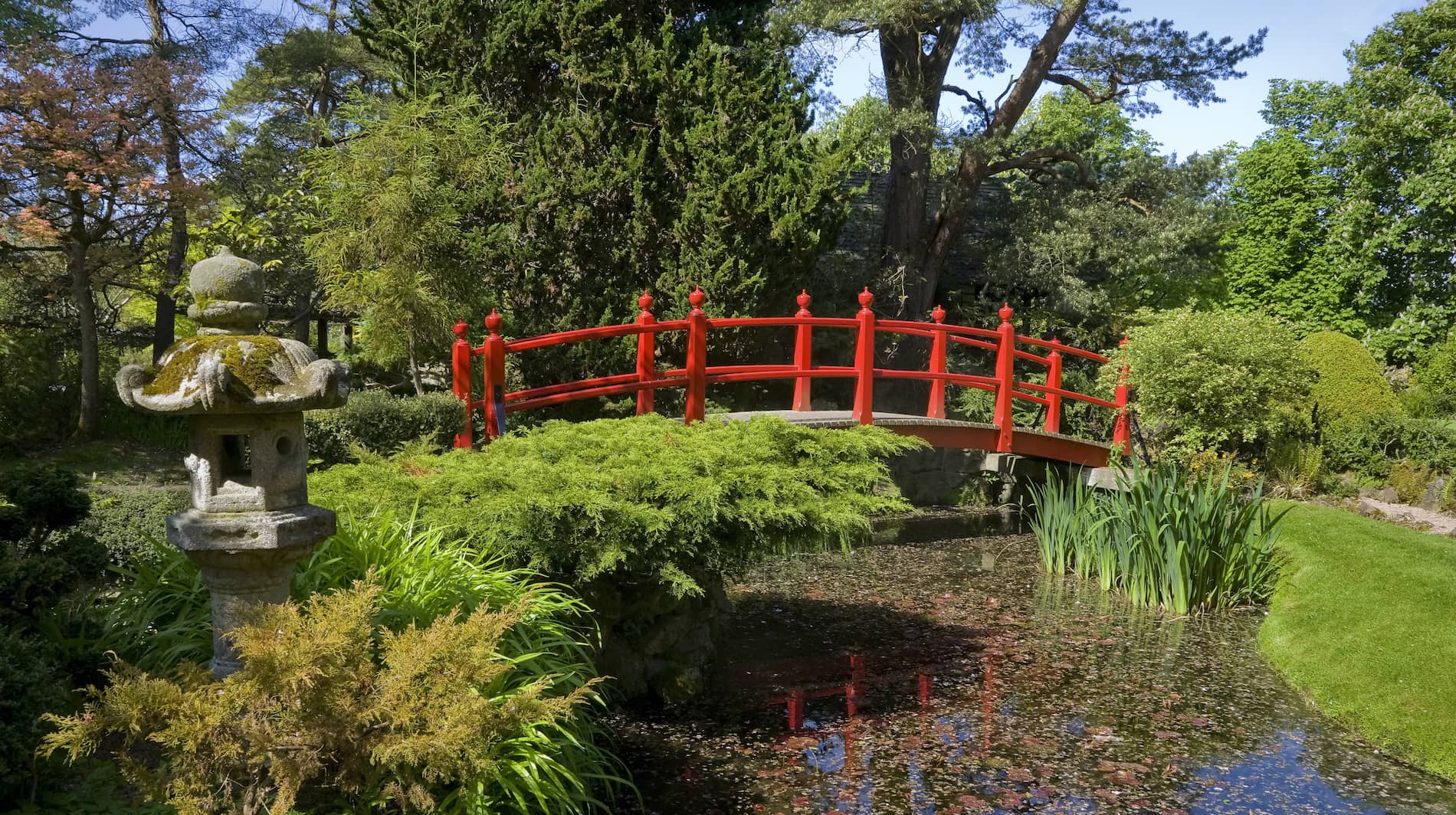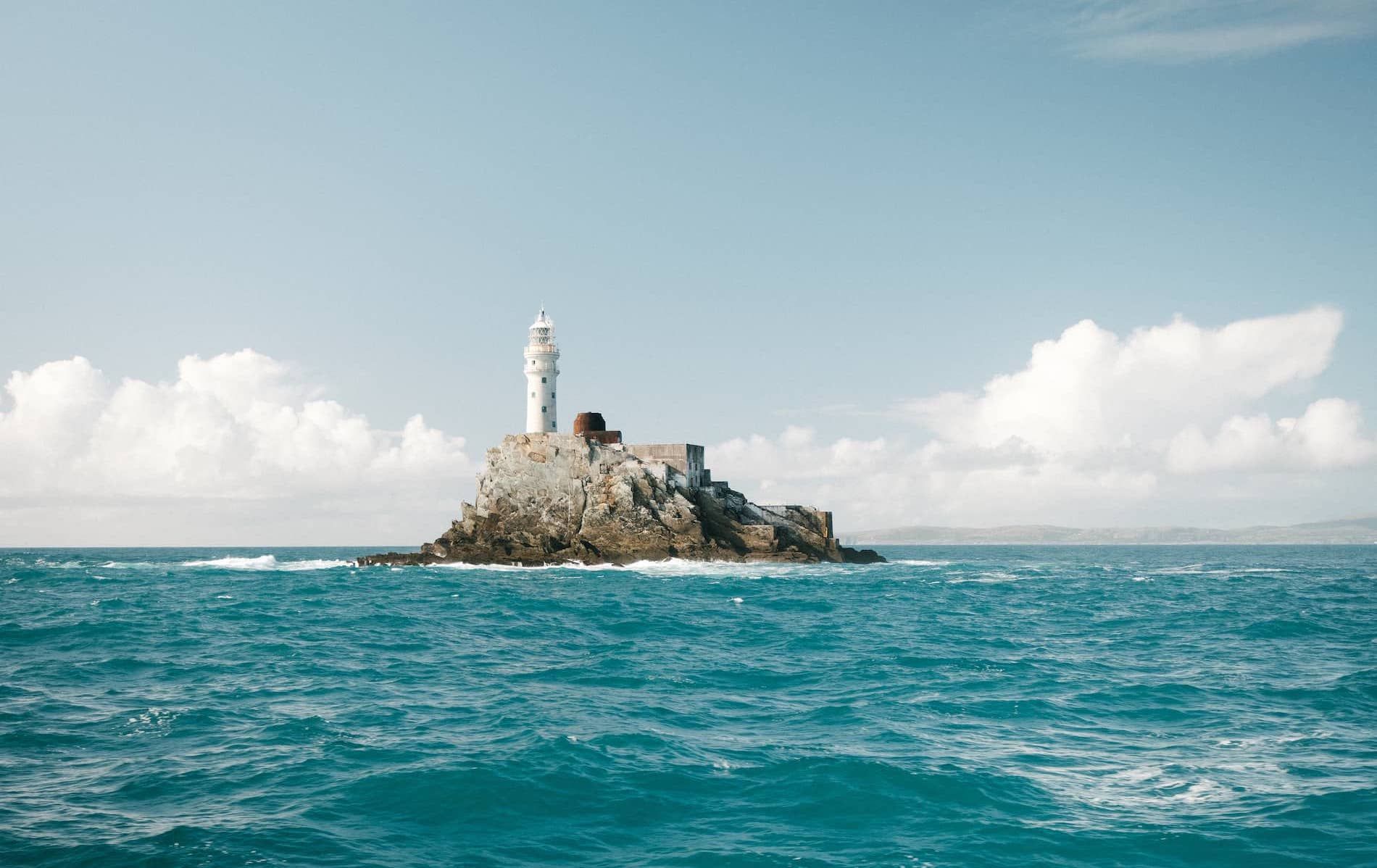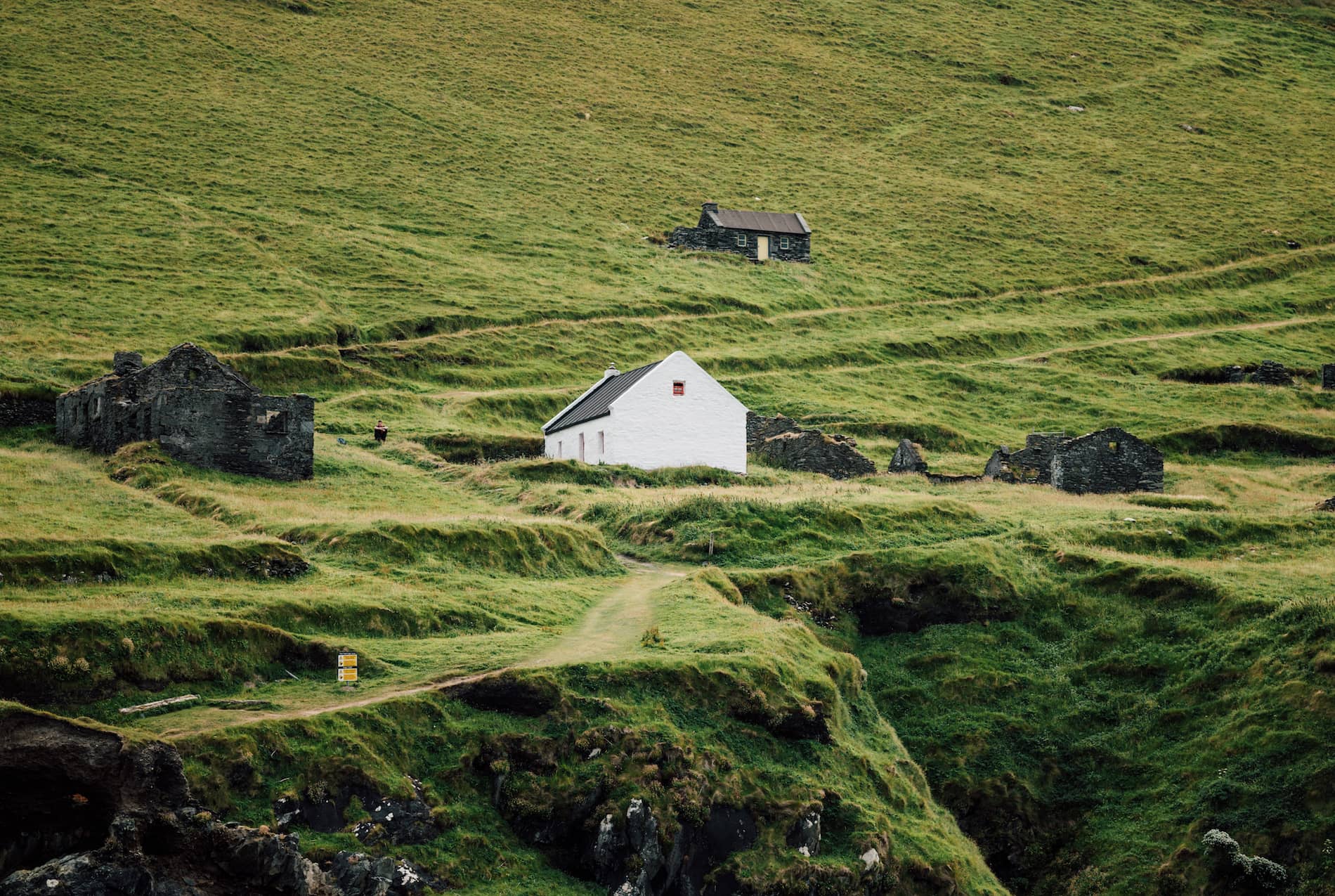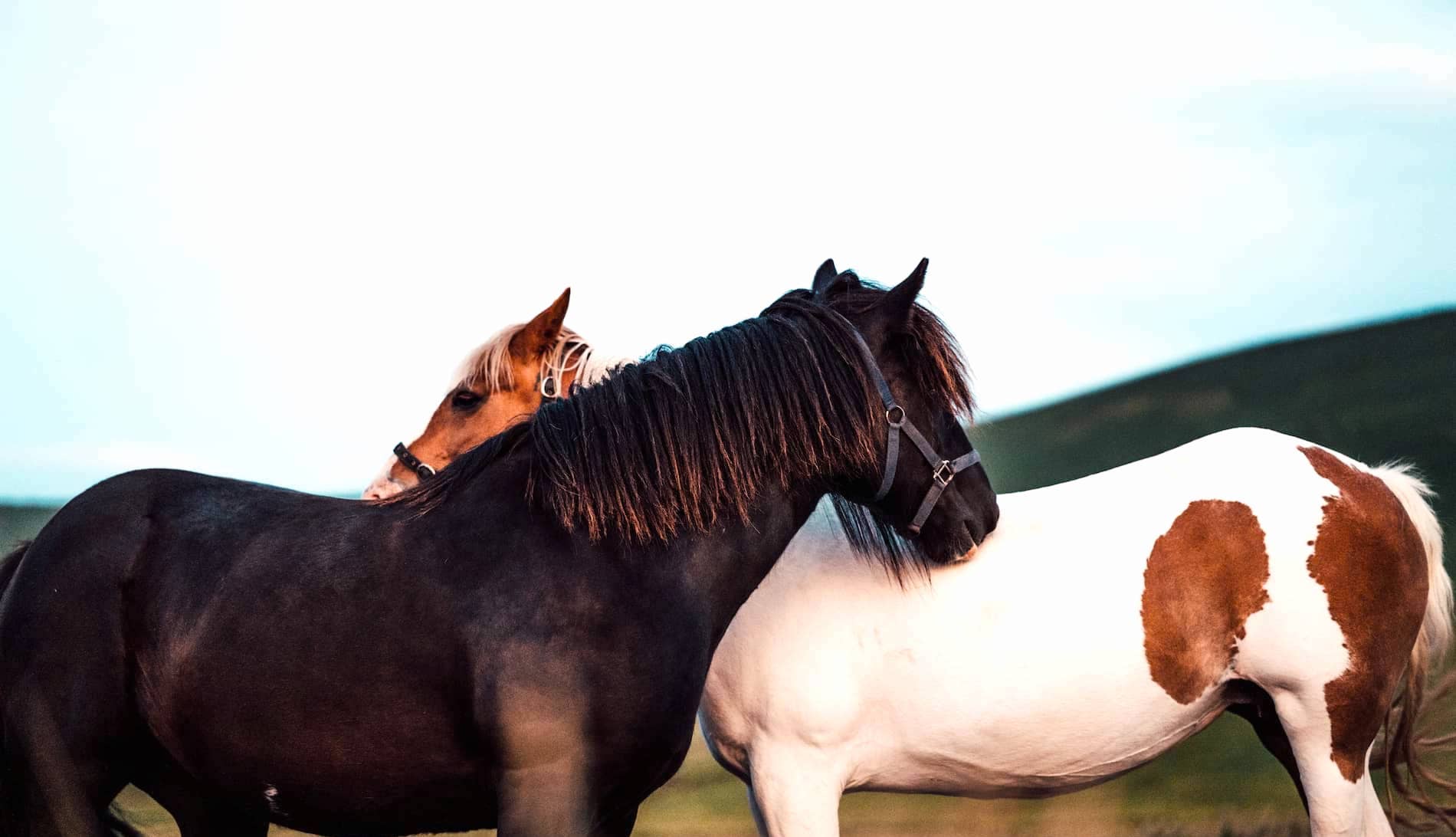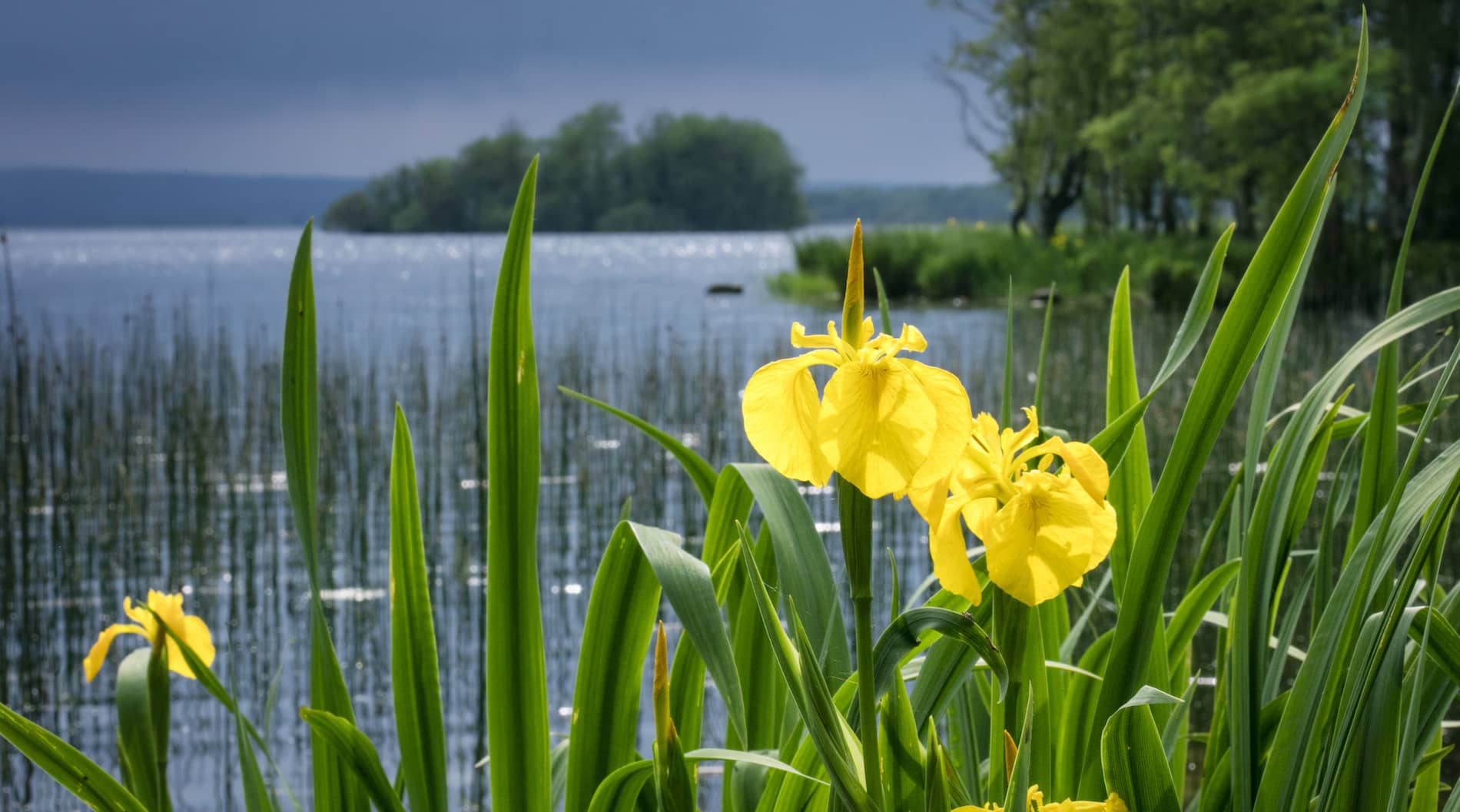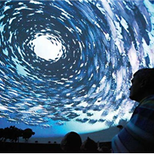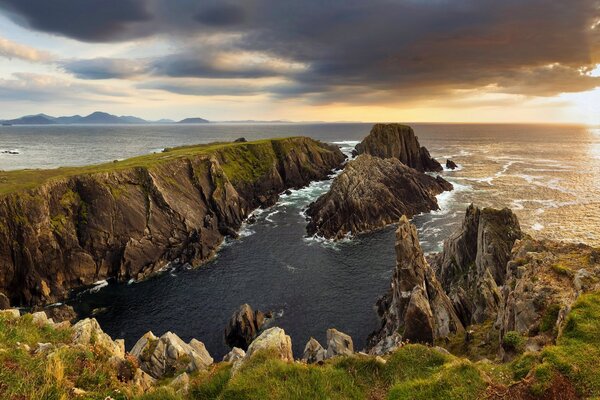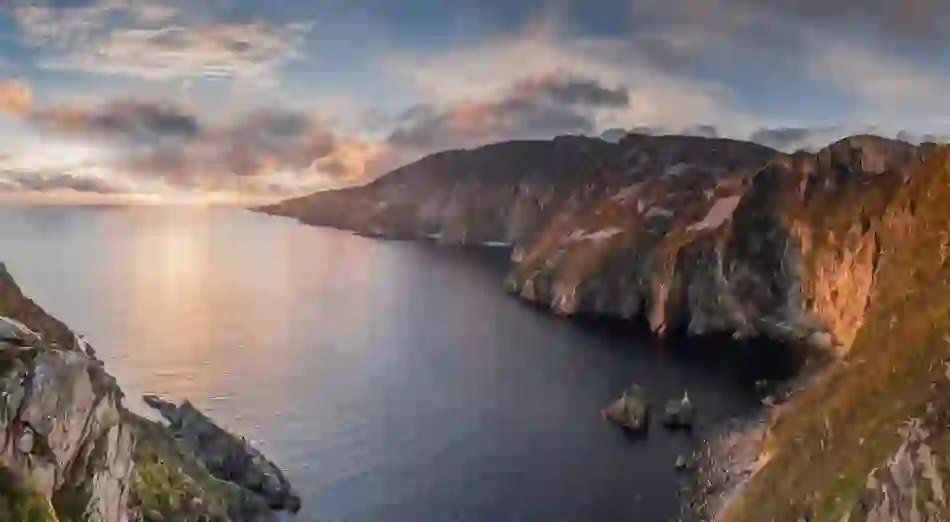
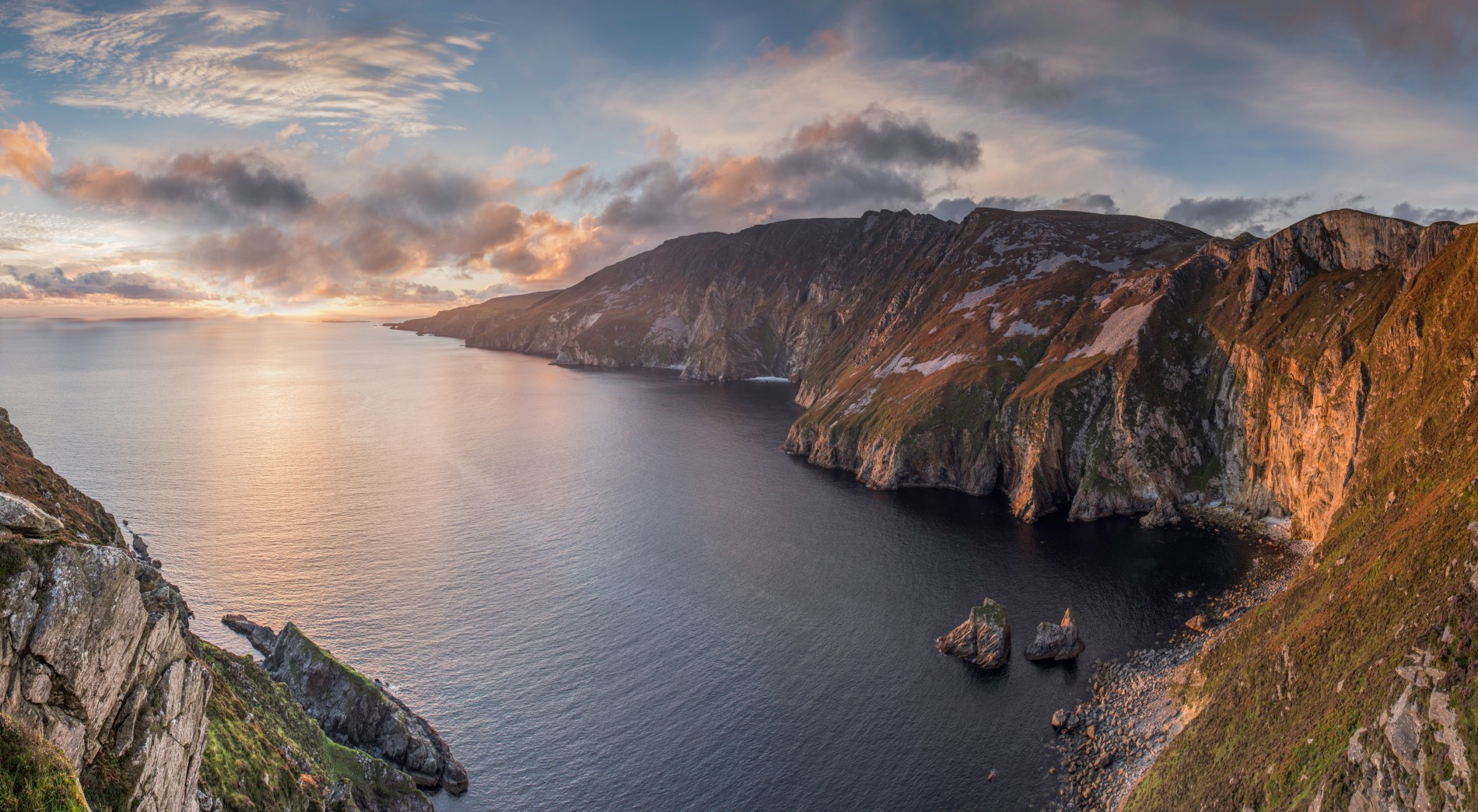
Donegal's northern headlands

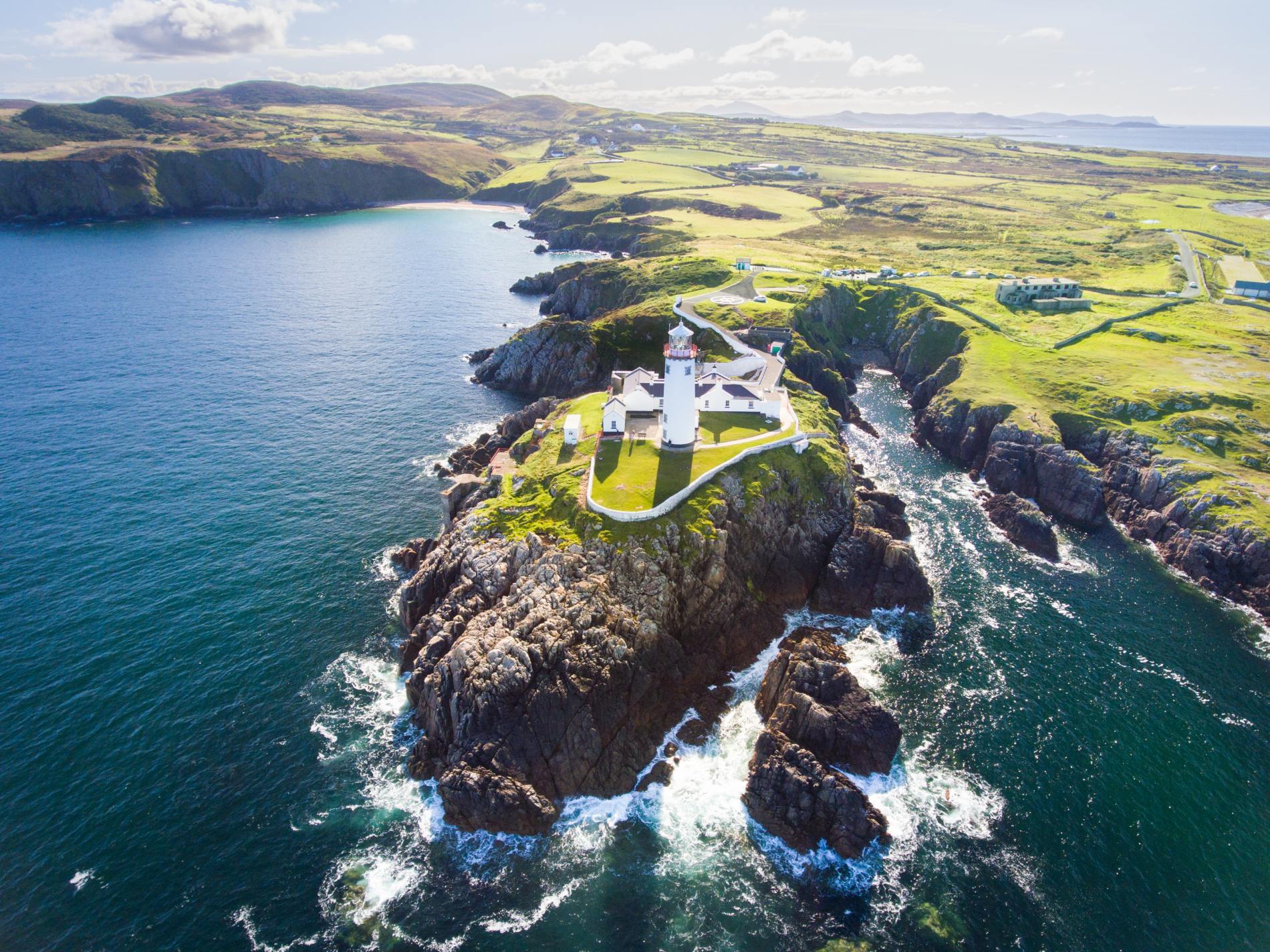

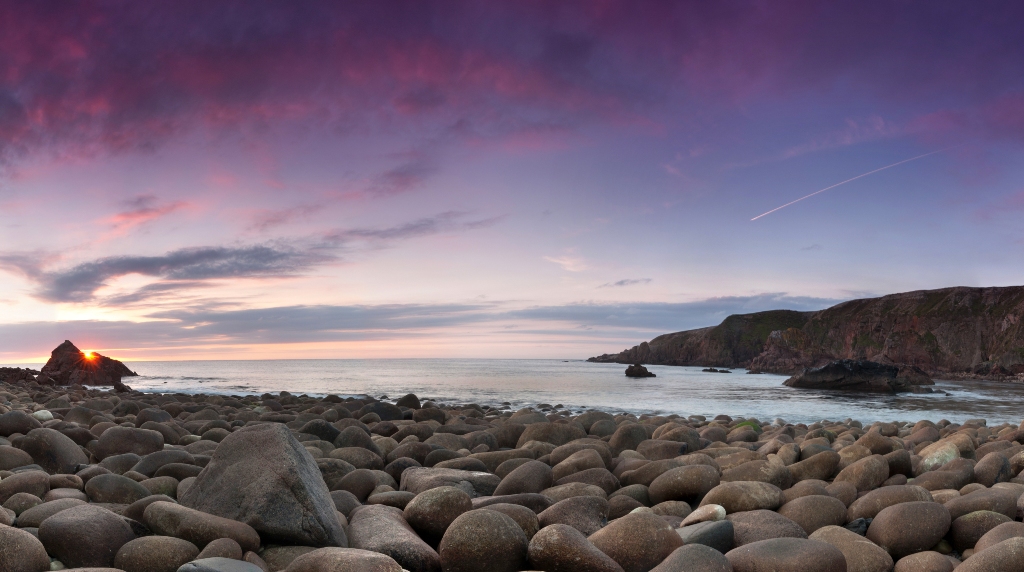
Dramatic views, clifftop wonders and a land etched with history: take a journey to the edge of the world, along the Wild Atlantic Way
Following on from Northern Ireland’s Causeway Coastal Route, your first venture into the Wild Atlantic Way brings you to the northern headlands of Donegal. Nature is spectacular and bracing here, from the sheer granite walls of Europe’s highest sea cliffs at Slieve League, to the Northern Lights dancing in clear winter skies and millions of seabirds gathering in great estuaries. Beginning at Muff, on the border of counties Londonderry and Donegal, this trail weaves around the great wilderness of the Inishowen Peninsula before striking out to the coastline of the northwest.

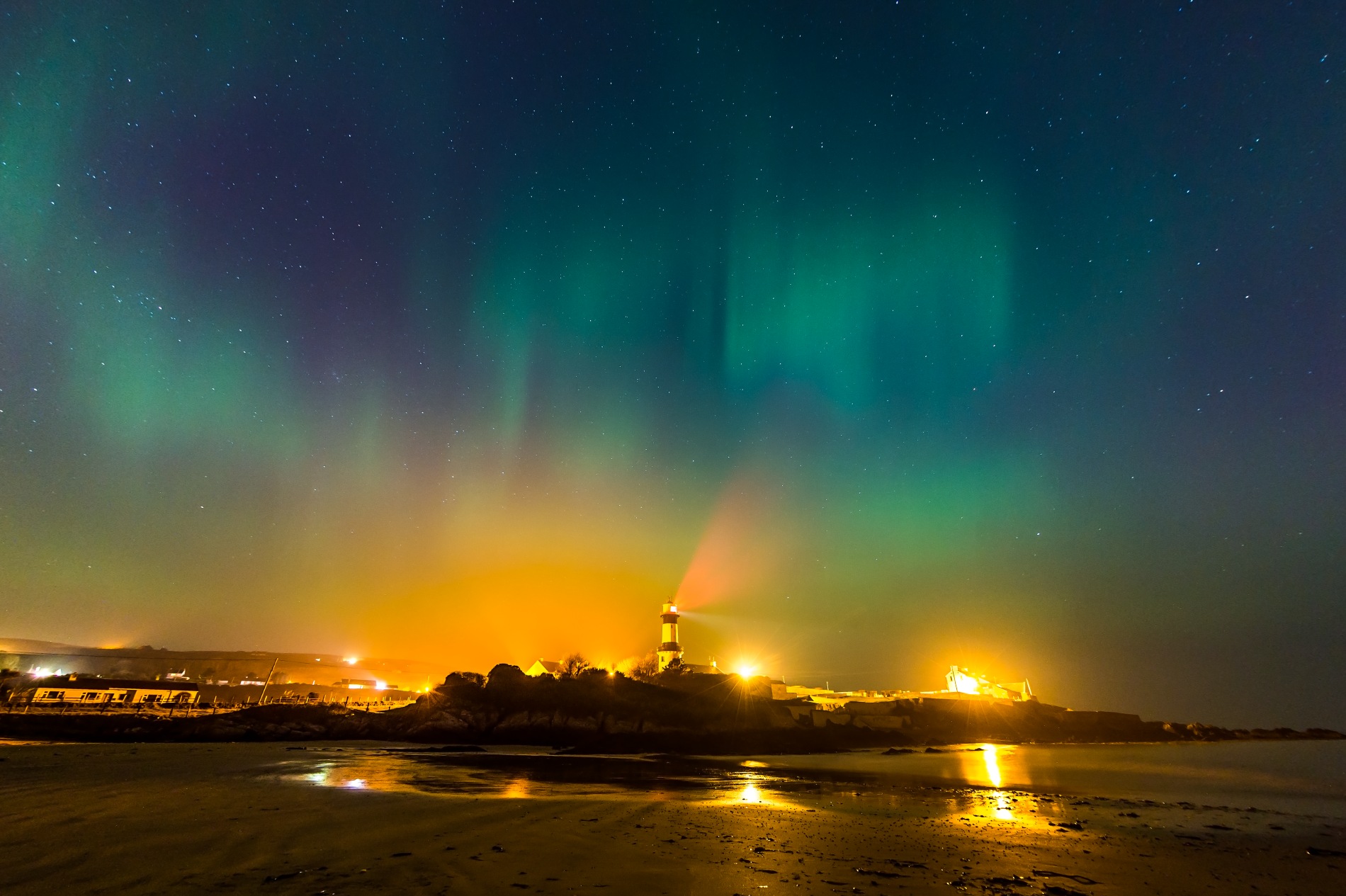
Day 1
Turbulent seas, clouds rolling across the sky, seabirds whirling in the air – these northern headlands showcase the dramatic scenery and rugged flair on the Inishowen Peninsula.
Explore Day 1A maritime story and an ancient fort
Greencastle, County Donegal

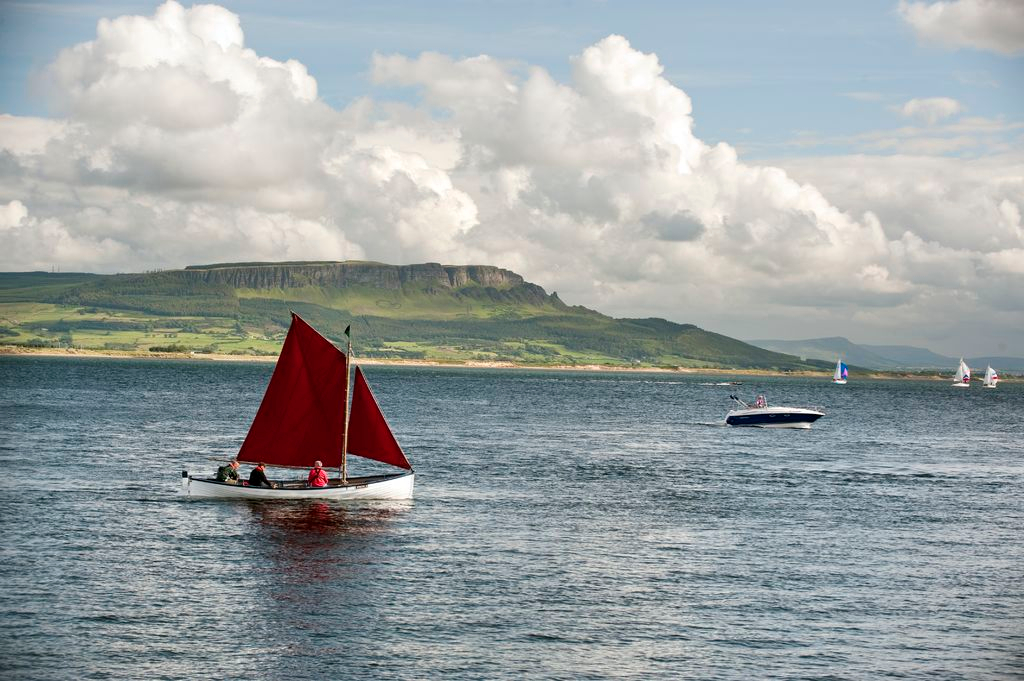
With such epic surroundings, there was always going to be a deep-rooted relationship between the wonderful people of Inishowen and the sea. Intriguing tales of how local life has been nurtured by nature, and insights into what lies beneath the ocean can be found at the Inishowen Maritime Museum and Planetarium in Greencastle, which houses information on everything from basking sharks to B17 bombers.
If you have more time, you could start your tour from the historic walled city of Derry~Londonderry, home of the Derry Girls. There's no better way to explore the city than the Derry Girls walking tour. Not only will your guide take you to some of the hit show's best-known filming locations but they'll also fill you in on the local history along the way. If you'd like to know more about the show, head to the Tower Museum for its fun Derry Girls Exhibition, alongside interesting local history.
Once you’ve seen the sights and worked up a good appetite, the Derry Girls Afternoon Tea is a great way to end your day. The perfect way to say goodbye to Erin and the gang as the credits roll on the final series…
39 km
Northern lights and Star Wars
Malin Head, County Donegal

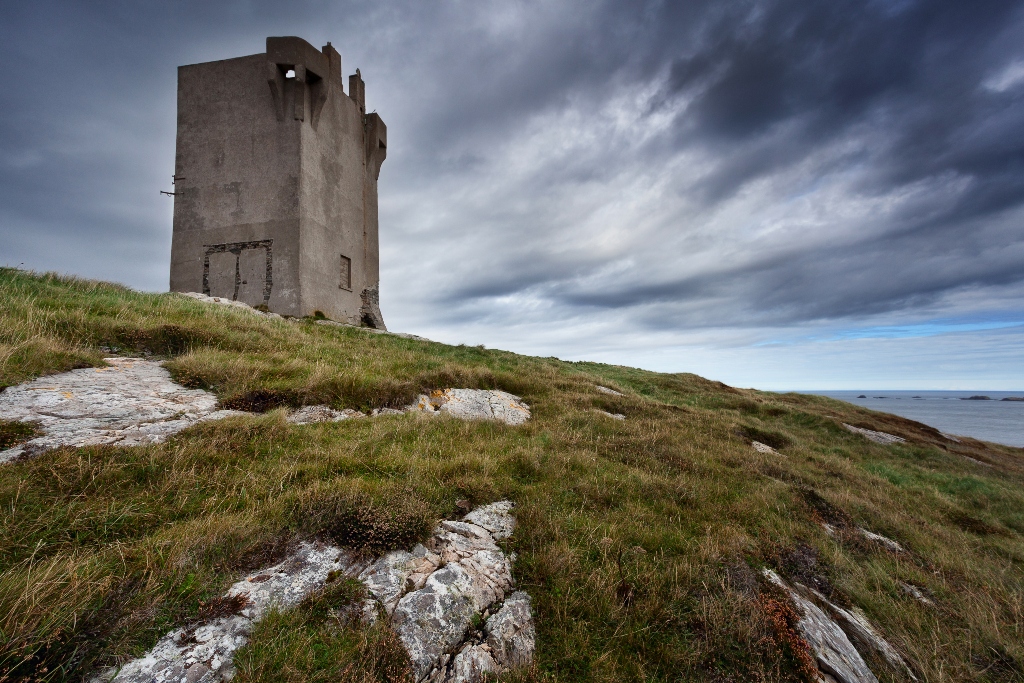
When they say Donegal has a wild side, that includes the skies and the sea. If the weather is favourable, look up and catch the Northern Lights (Aurora Borealis). While they are dependent on the right climatic conditions, Inishowen is often graced with their phenomenal light show. These dancing colours hanging over Malin Head are an astonishing sight; no wonder the Star Wars filmmakers chose it as a location for Episode VII: The Force Awakens. If you fancy discovering what lies beneath the waters around Inishowen, try a boat trip or even a diving trip with Aquaholics. Malin Head has a fascinating collection of shipwrecks that can be explored. As you continue your journey south, drop in to Nancy’s Barn in Ballyliffin for a bowl of their award-winning seafood chowder.
65 km
Ptolemy's preview of Grianán of Aileach
Grianán of Aileach, County Donegal

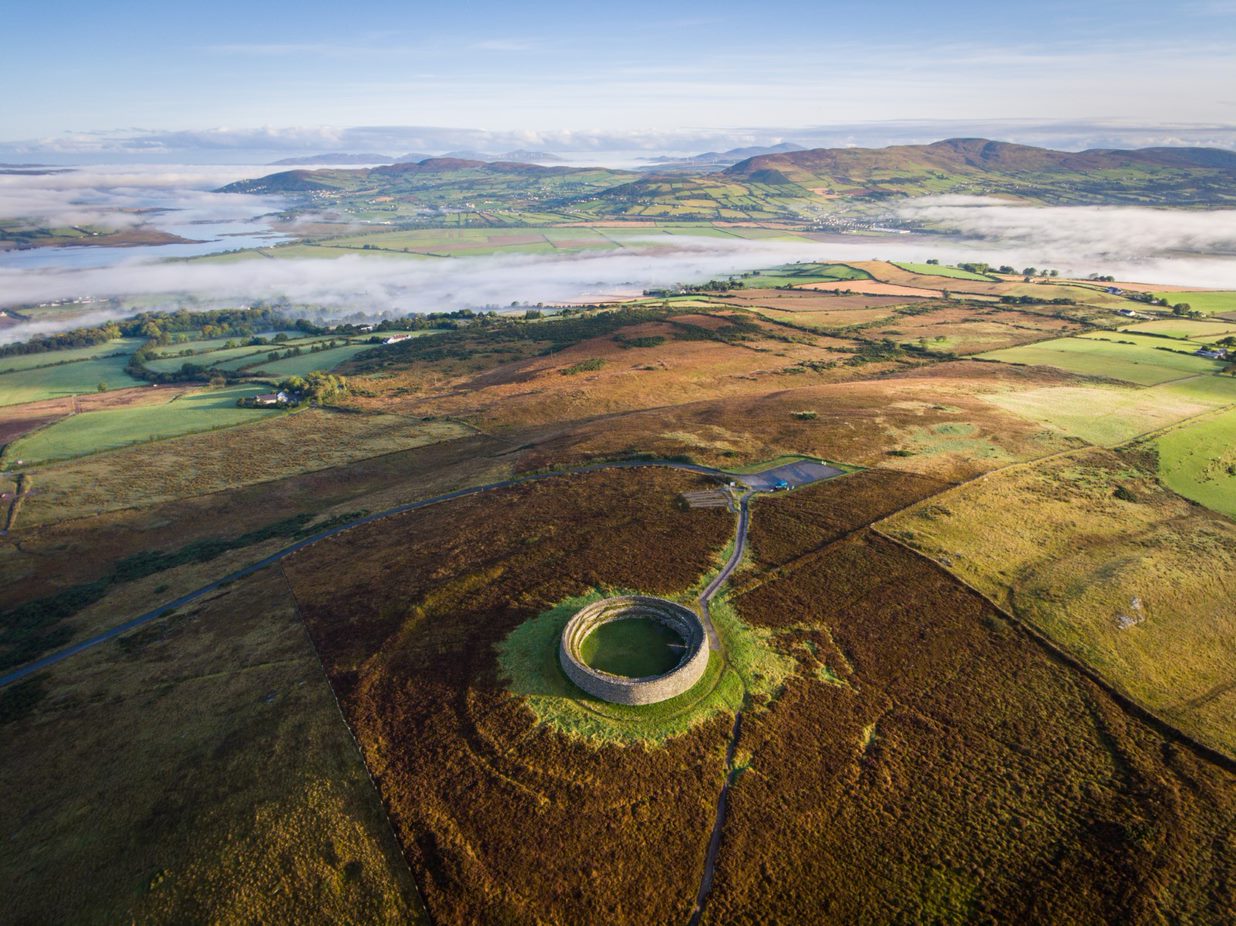
The road out of the Inishowen Peninsula cuts through some 3,000 acres of land reclaimed from the sea in Burt, and makes for an excellent spot for birdwatching and walks. But we’re heading up the hill to the renowned Grianán of Aileach, a restored prehistoric fort with simply spectacular views. This feat of architecture was even referenced by Greek astronomer and geographer, Ptolemy, in his 2nd-century map of the world. Be sure to also visit the remarkable Church of St Aengus (1967) in Burt, which was inspired by the ancient stone fort.
70 km

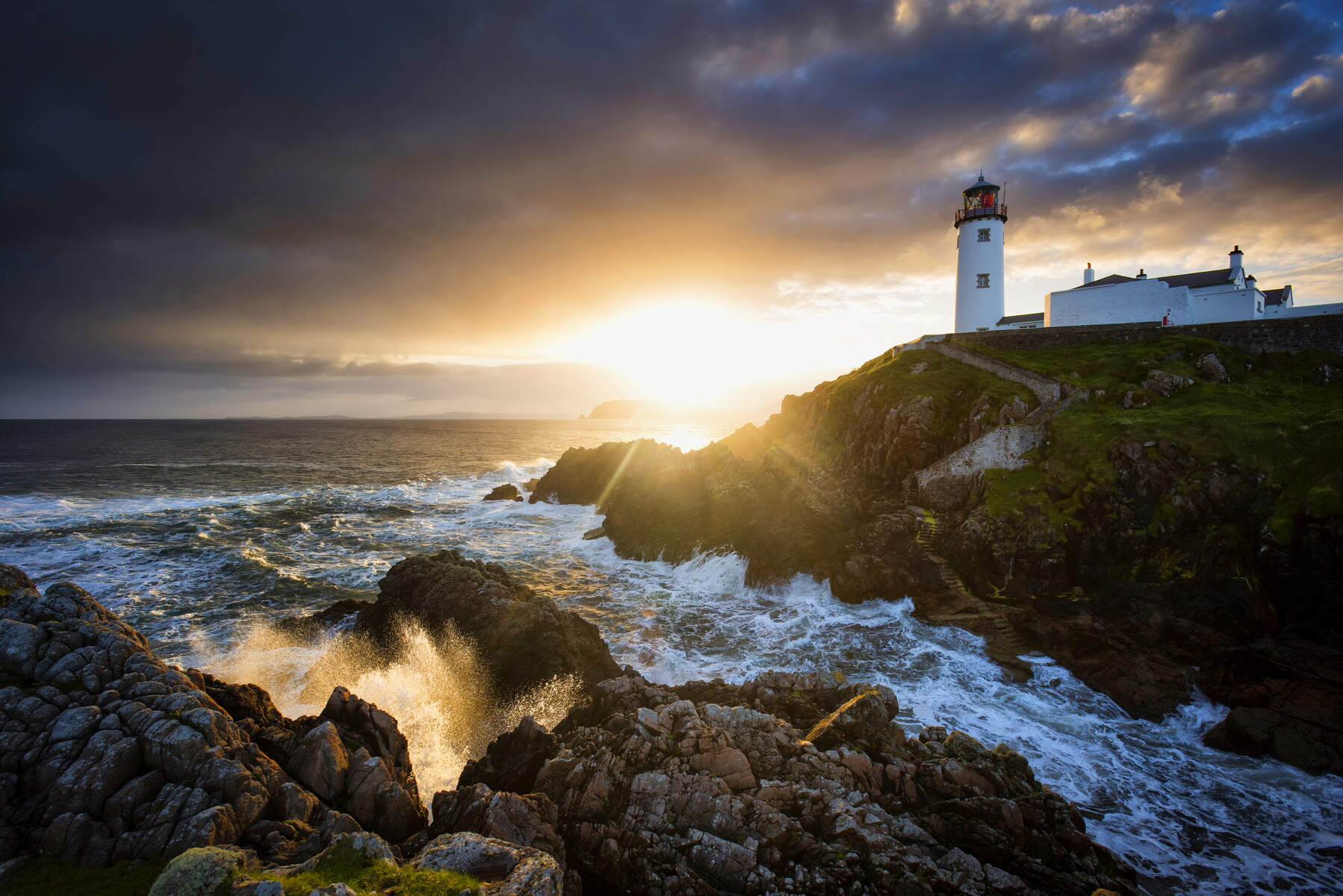
Day 2
Fanad Head is famed as the home of one of the world’s most beautiful lighthouses and you'll want your camera at the ready once you check out the panorama in front of you.
Explore Day 2Fanad Head
Doe Castle, County Donegal

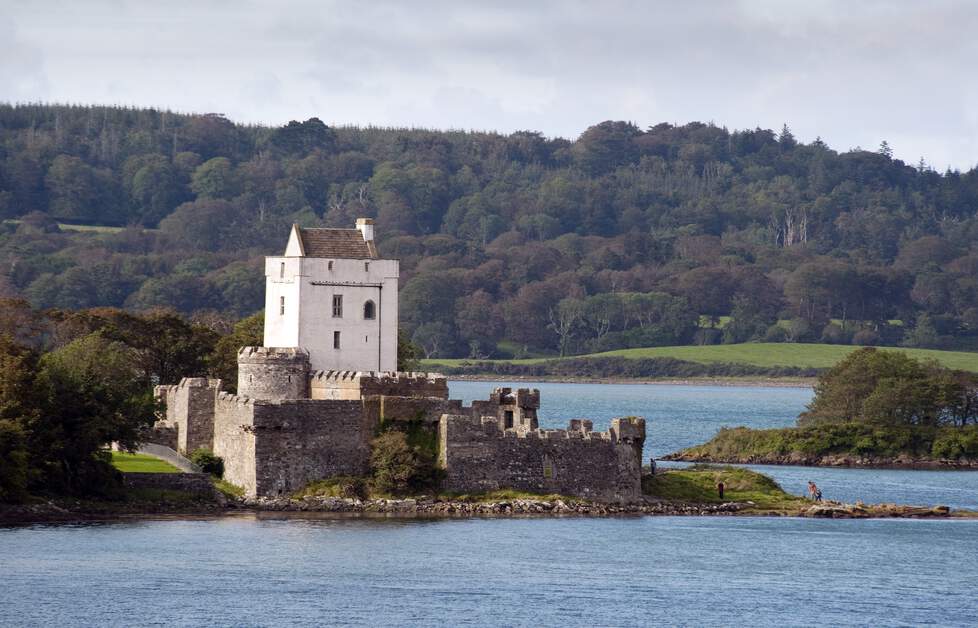
This wildly exposed headland is a wonderland of wildlife, including grey seals, dolphins and seabirds. But the jewel in the crown has to be Fanad Head Lighthouse, which has been safeguarding seafarers since it was built in 1817 – a response to the tragic shipwreck of the frigate, Saldanha a few years earlier. Climb the 76 narrow steps to the top of the tower for superb views of the northern coastline, hear the stories of shipwrecked parrots and lost gold on the lighthouse tour, or stay in one of the lightkeepers’ cottages and take the time to enjoy this beautiful spot.
If you have more time, pay a visit to Doe Castle, where shipwrecked survivors of the Spanish Armada were said to have been given shelter.
44 km
Glenveagh National Park and an Irishman's brainchild
Glenveagh Castle, County Donegal

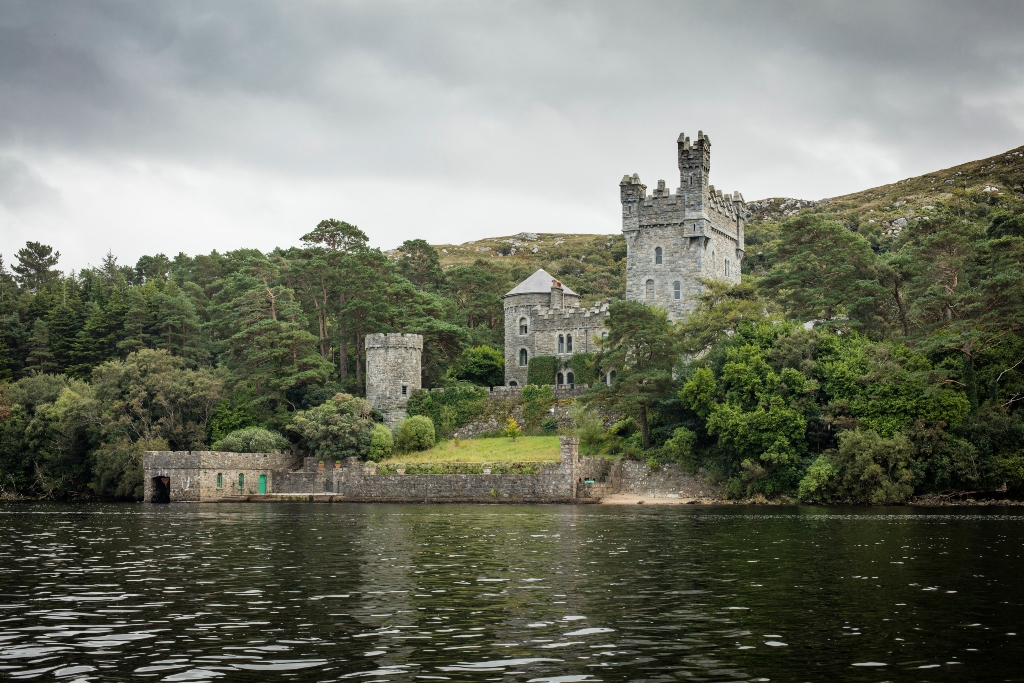
Set within 16,000 hectares of National Park you’ll find Glenveagh Castle. This majestic stronghold with its turrets and round towers was built by John George Adair, a Laois man who made his fortune as a speculator in America during the 19th century. He wanted the castle to stand out amongst the jaw-dropping scenery that surrounded it… and he succeeded. Glenveagh has hosted an impressive roll call of glamorous guests in its time, including Marilyn Monroe, Charlie Chaplin and Greta Garbo. This is a castle with real star power. After strolling the grounds, it's time to relax at the Thyme Out Tea Rooms and Restaurant at Glenveagh Castle Gardens for home-cooking at its very best.
12 km
A saint's journey and intriguing artworks
Colmcille Heritage Centre, County Donegal

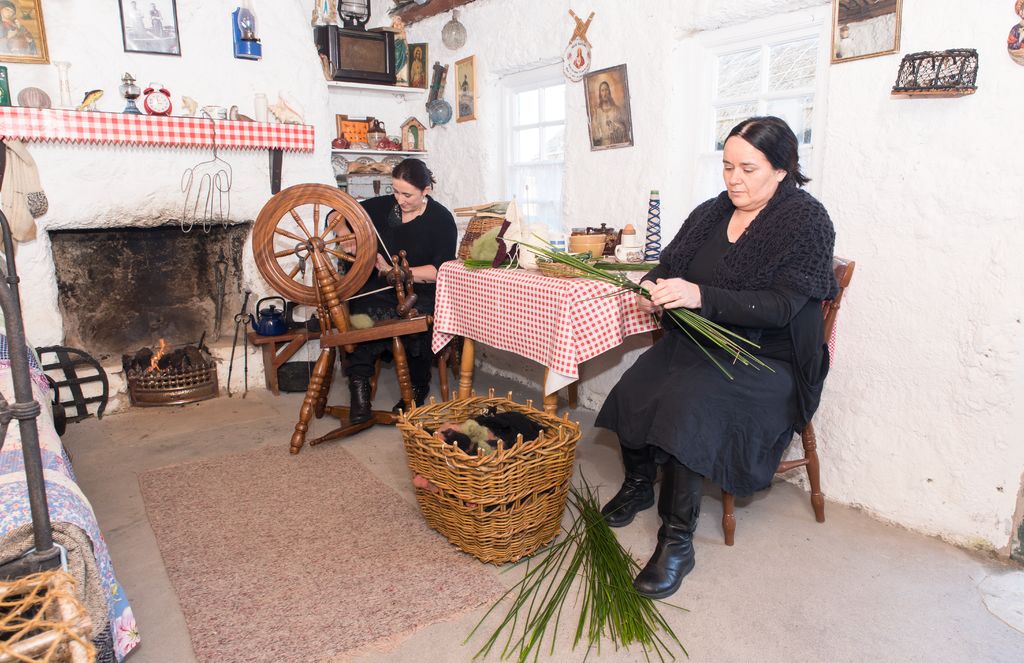
Travel back in time to the 6th century. Europe had been overrun by pagan tribes but was in the midst of being Christianised by a resurgent Irish church. Saint Colmcille was the pre-eminent figure in this period, not just in Ireland but in all of Christendom. His story is told through beautifully reproduced artefacts and panels at the Colmcille Heritage Centre, alongside artwork from local artists. For another intriguing exhibition, make a beeline for Glebe House & Gallery: the Derek Hill Collection, which houses works from artists including Picasso and Kokoshka. If you have more time, dine out in the Lemon Tree Restaurant in Letterkenny: contemporary Irish cooking inspired by classic French roots. Delicious.
36 km
A treasured island
Tory Island, County Donegal

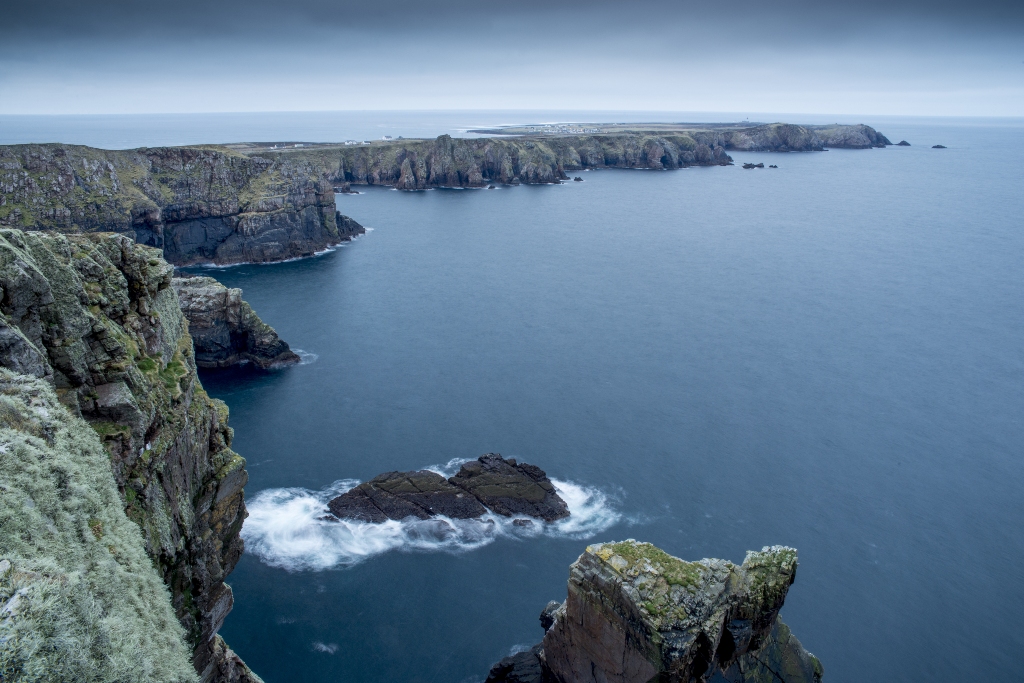
Take a boat trip to the Irish-speaking Tory Island from Magheraroarty Pier and visit the Tau Cross, one of only two tau or t-shaped crosses on the island. Locals are sure to regale you with tales of Tory's past. The island was said to be a stronghold of the Fomorians, a supernatural race whose best known figure was Balor of the Evil Eye.
7 km
Bloody Foreland and Balor of the Evil Eye
Bloody Foreland, County Donegal

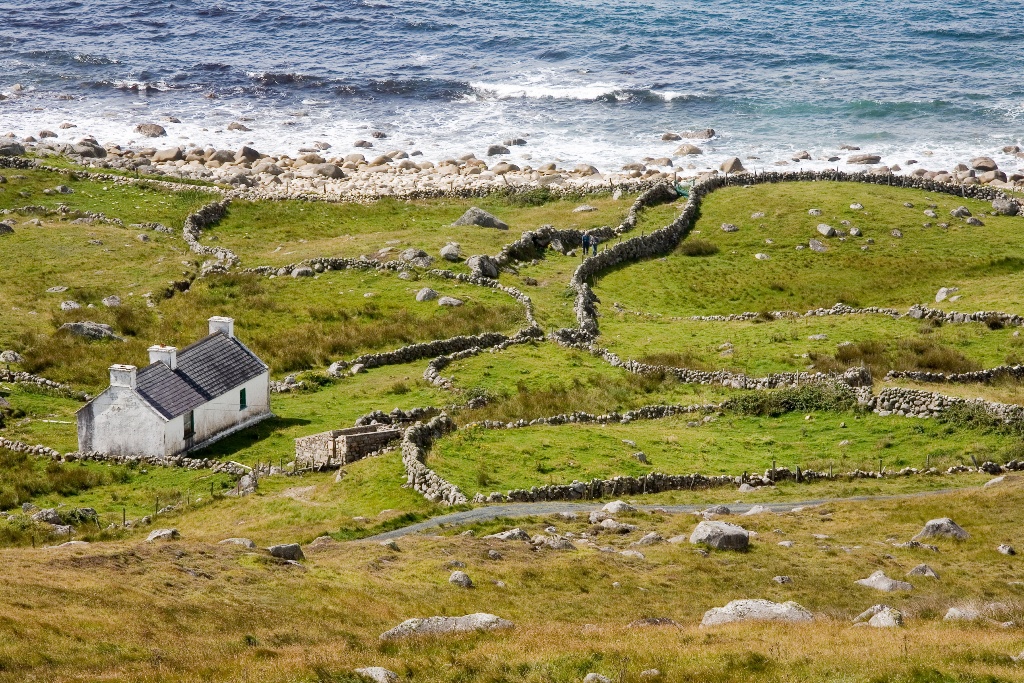
Despite its sinister moniker, Bloody Foreland has no tragic history to warrant the title. Instead, it derives its name from the evening sun that illuminates the rocks to a rich red hue. But this is Ireland, and where no facts exist, there is always folklore. This tale focuses on an unlikable warlord “Balor of the Evil Eye”, (yes, him again) who was eventually slain by his grandson Lugh Lámh Fhada. Some say that the tide of blood that flowed from Balor’s Evil Eye was what stained this hillside. Fact or folklore, the views from here are breathtaking.
If you have more time, hang out in a local pub like Teac Jack or Teach Hiúdaí Beag, or head to Leo's Tavern – renowned for being the family home of Enya, Clannad and Moya Brennan.
31 km

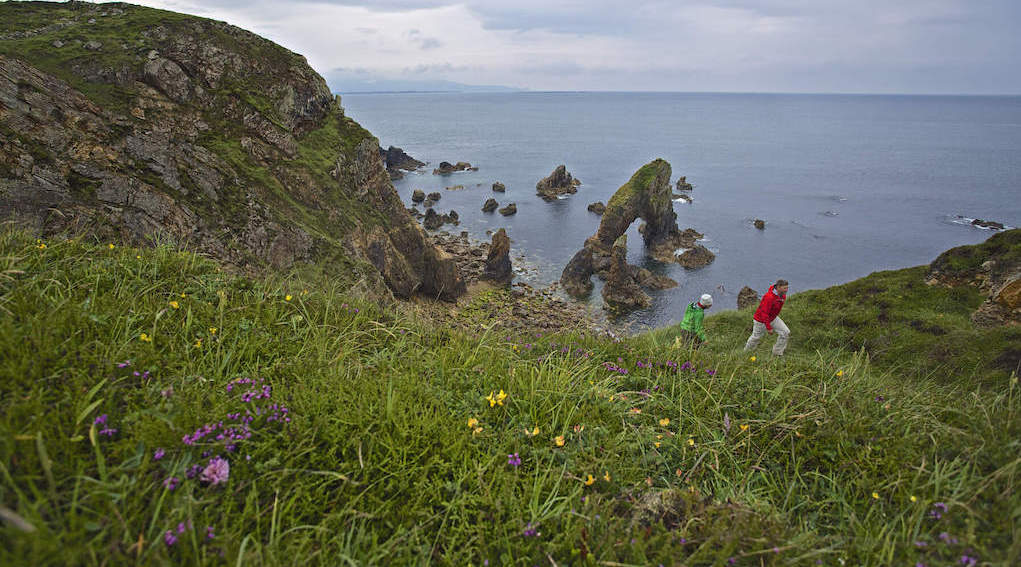
Day 3
This stretch of land faces daily onslaught from the powerful Atlantic waves but stubborn sea stacks refuse to buckle under their might. Rest easy, though, there are gentler shorelines where you can clear the cobwebs...
Explore Day 3Music, craic and an incredible arch stack
Dungloe, County Donegal

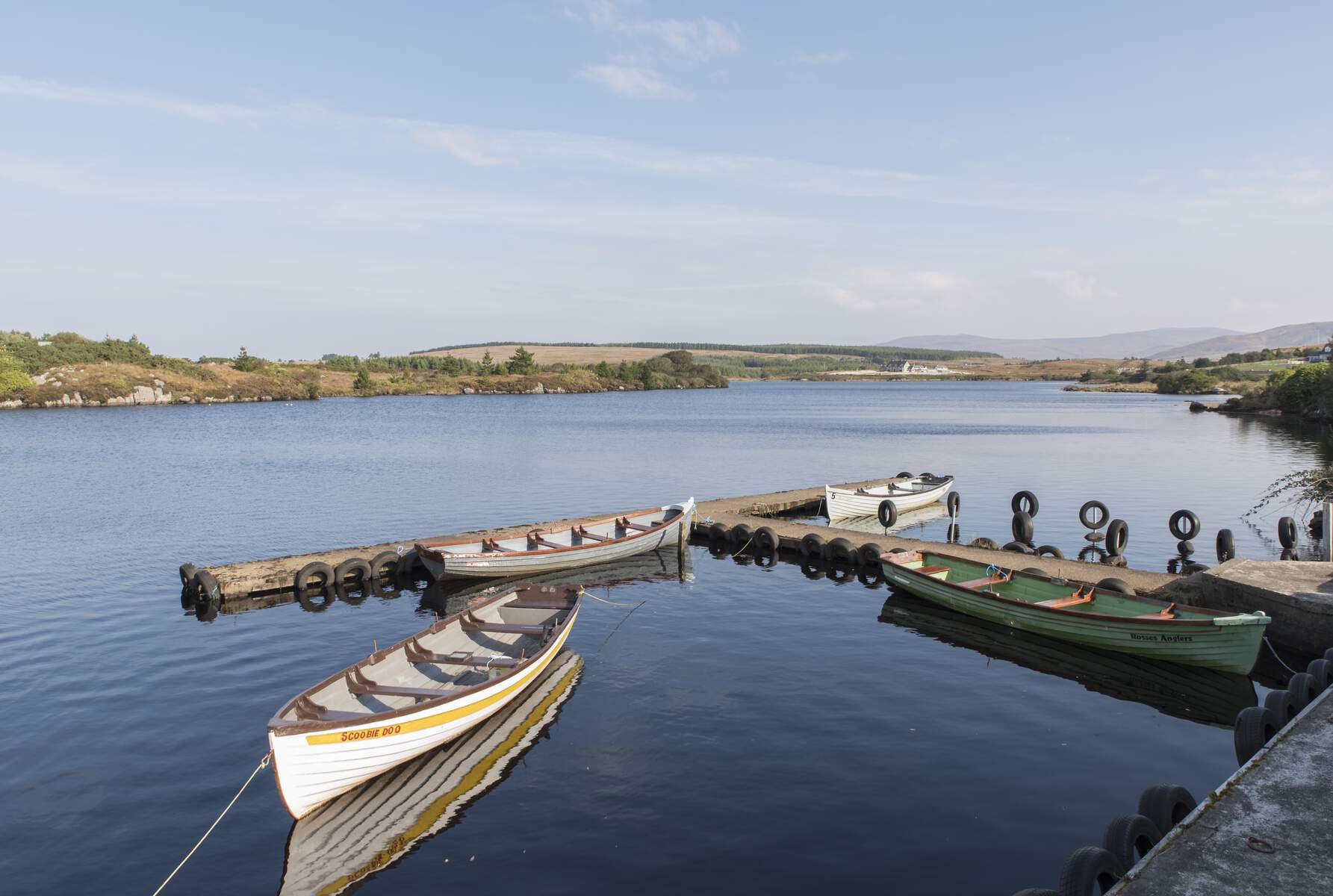
There's a whole lot going on around Dungloe. Linger here a while to enjoy a rip-roaring live traditional Irish music session in Beedy’s Bar, owned by the family of Moya Doherty, co-founder of Riverdance. And if you arrive at the June bank holiday weekend, you’re just in time to join the Rosses Walking Weekend – plenty of craic guaranteed. If that’s all too much to take in, the gravity-defying Arch Stack at nearby Maghery is sure to take your breath away.
If you have more time, take a trip out to Arranmore Island from Burtonport and check out the wild island’s sandy beaches, rocky cliffs and views of the majestic mainland mountains.
26 km
Soak up the views at Glenties
Portnoo Golf Club, County Donegal

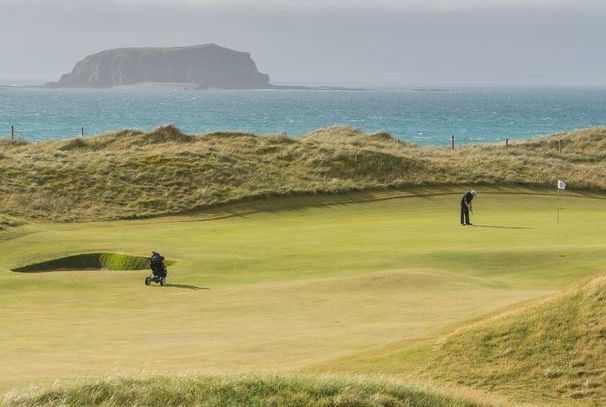
The town of Glenties lies at a point where two glens and two rivers converge, the Owenea and the Stracashel – the Owenea is the one better known for fishing. Our advice is to bring your fishing rod, get your permit from the Owenea Angling Centre and start teasing for a bite. For those who want to leave the wellies behind, wander the rooms of St Connell's Museum and Heritage Centre, where you'll find a moving commemoration of the Great Famine of 1845-1847, which saw Donegal’s potato crop obliterated. Golfers also take note: the Narin and Portnoo Golf Club is a scenic 18-hole links course with sweeping views of Gweebarra Bay. Anyone for tee times?
10 km
The home of Donegal Tweed
Assaranca Waterfall, County Donegal

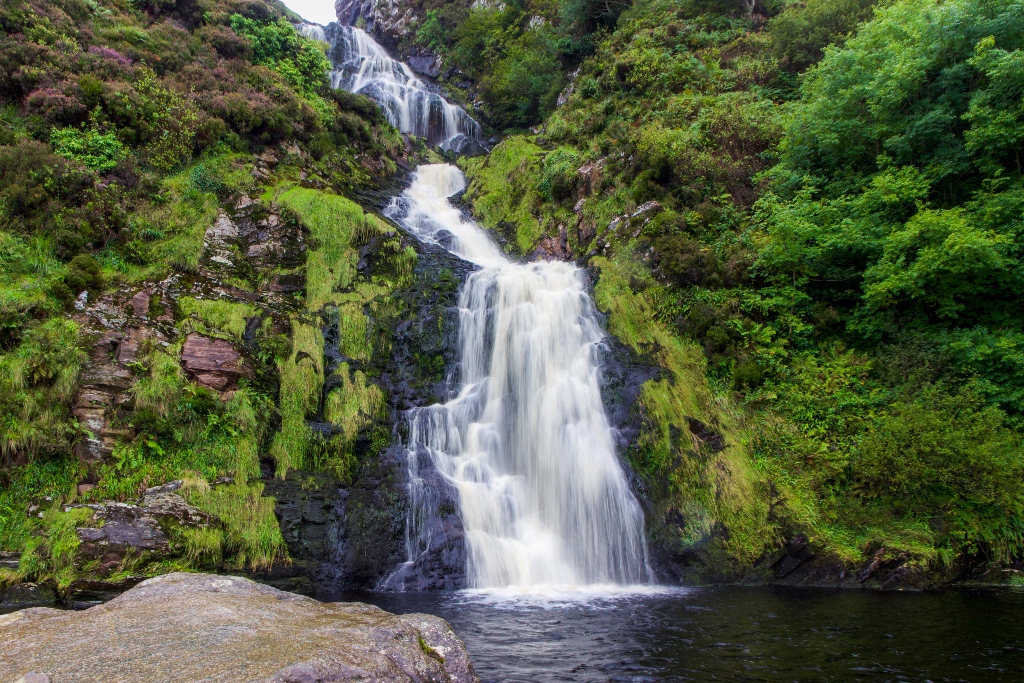
You'll be utterly charmed by the warm welcome you receive in the close-knit community of Ardara. While at the Donegal Tweed Centre, find out all about the tradition of hand-weaving tweed (we challenge you to leave without bringing a sample of this beautiful fabric with you). Just outside Ardara, meanwhile, and past the Assaranca Waterfall, are the Maghera Caves. It’s said that during penal times, locals would hide out here to avoid capture.
If you have more time, check out Nancy’s Bar, a renowned traditional pub run by the McHugh family – and the epitome of friendliness.
27 km

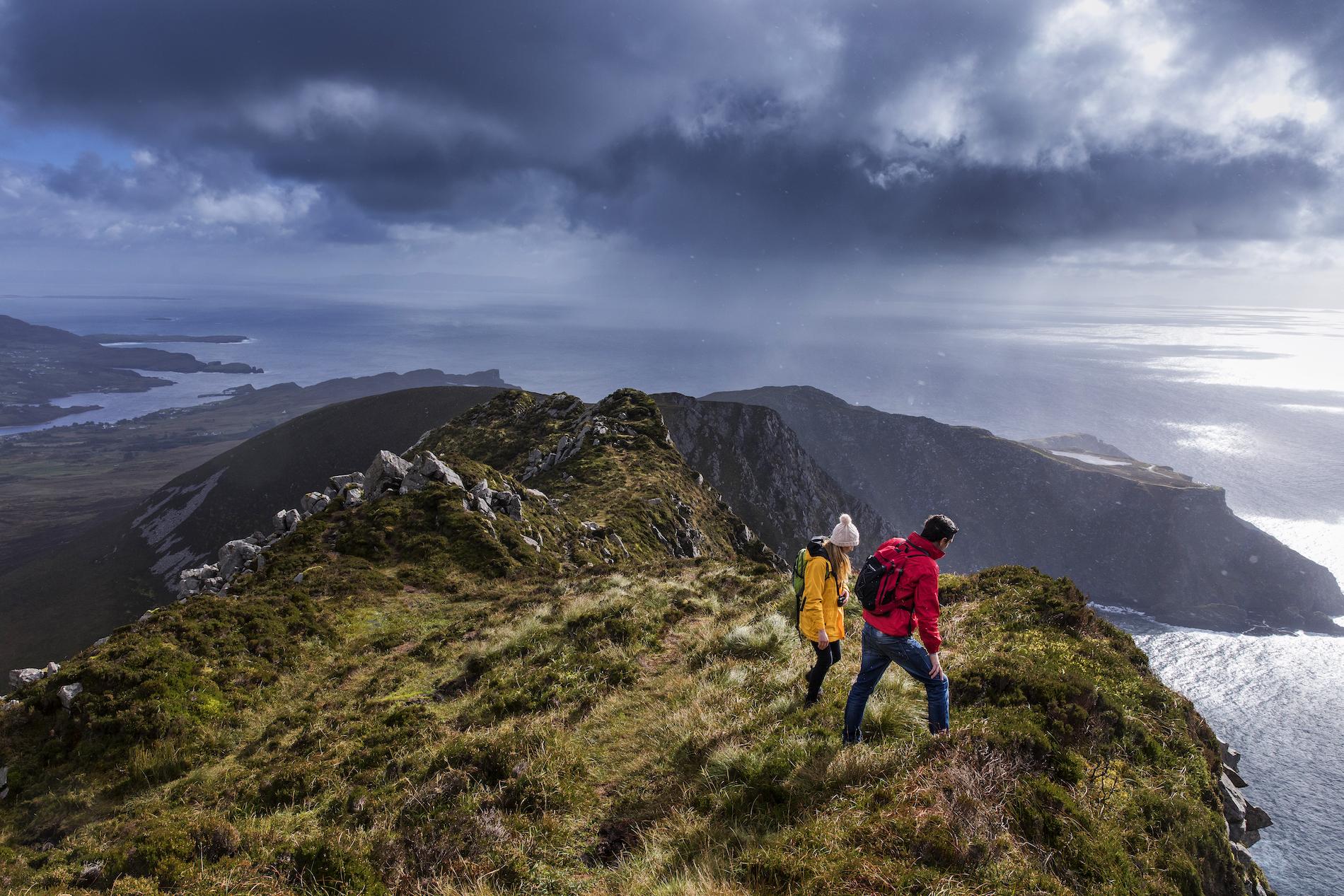
Day 4
Sometimes the roads to nowhere or the back of beyond are the only roads worth travelling. Refresh the mind, body and spirit between Glencolmcille and Donegal.
Explore Day 4A glimpse into the past at Glencolmcille
Glencolmcille Folk Village, County Donegal

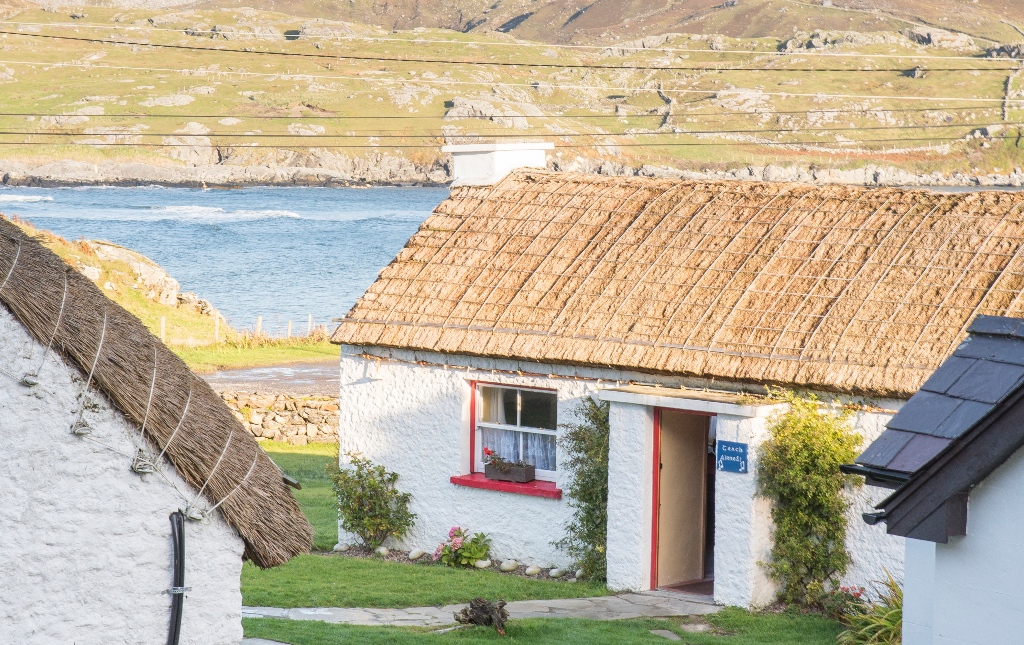
Although Glencolmcille's remoteness has been described as "the back of beyond", that's an injustice to the beauty of this area, which is peppered with ancient dwellings and megalithic tombs. Glencolmcille owes its name to Saint Columba, one of Ireland's three patron saints, who came to this glen during the 6th century. A trip to the Silver Strand, once notorious for smuggling, will reward you with stunning views of a gorgeous beach surrounded by rocky cliffs, while guided tours of the Glencolmcille Folk Village offer a warm Donegal welcome and an intimate experience of past ways of life.
If you have more time, check in on the secluded bay of Malinbeg for more of the air that leaves your lips salty and your mind refreshed.
14 km
Sea cliffs and swirling seabirds
Slieve League, County Donegal

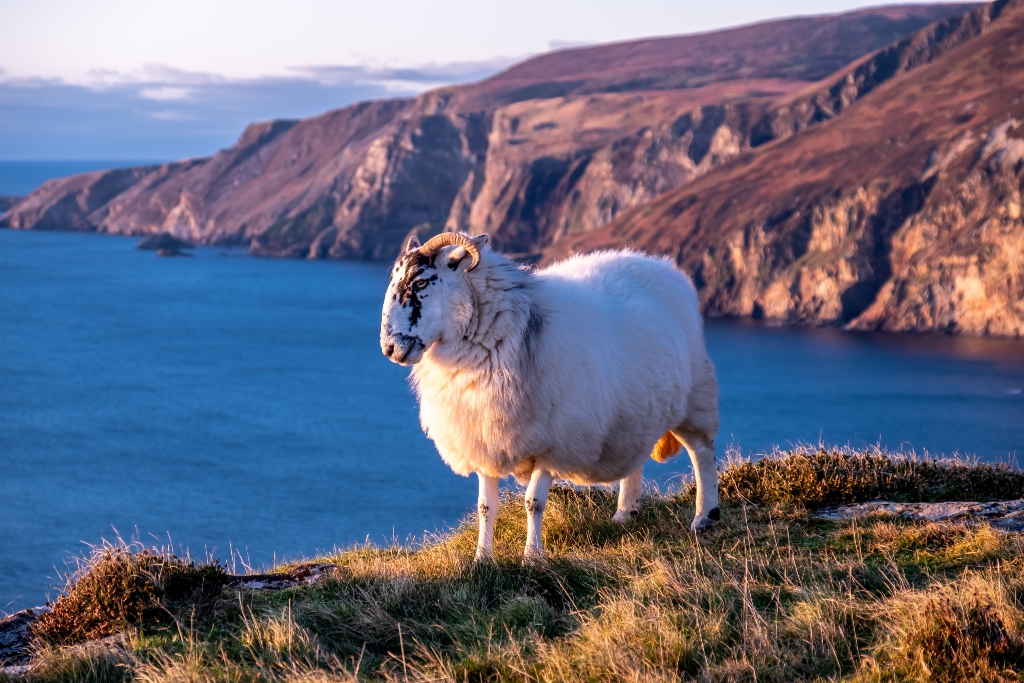
A highlight of any visit to Donegal are the wondrous Slieve League cliffs, among the highest sea cliffs in Europe at 601m (1,972 feet). Leave your car in the car park and enjoy the walk to the viewing platform, where spectacular views of Donegal Bay and the Sligo Mountains await you. And look out too for stones marking out the word "Éire", a navigation aid for aircraft during World War II. Nearby, at the tiny harbour of Teelin, a brown-cowled figure clasps his hands solemnly in prayer alongside a boat. This memorial symbolises the 5th century monks who left from this historic part of Donegal to sail the treacherous seas to Iceland.
If you have more time, treat yourself to lunch at Kitty Kelly’s, which specialises in seafood and French cuisine.
49 km
Fort of the foreigners and seafood fresh off the boats
Killybegs, County Donegal

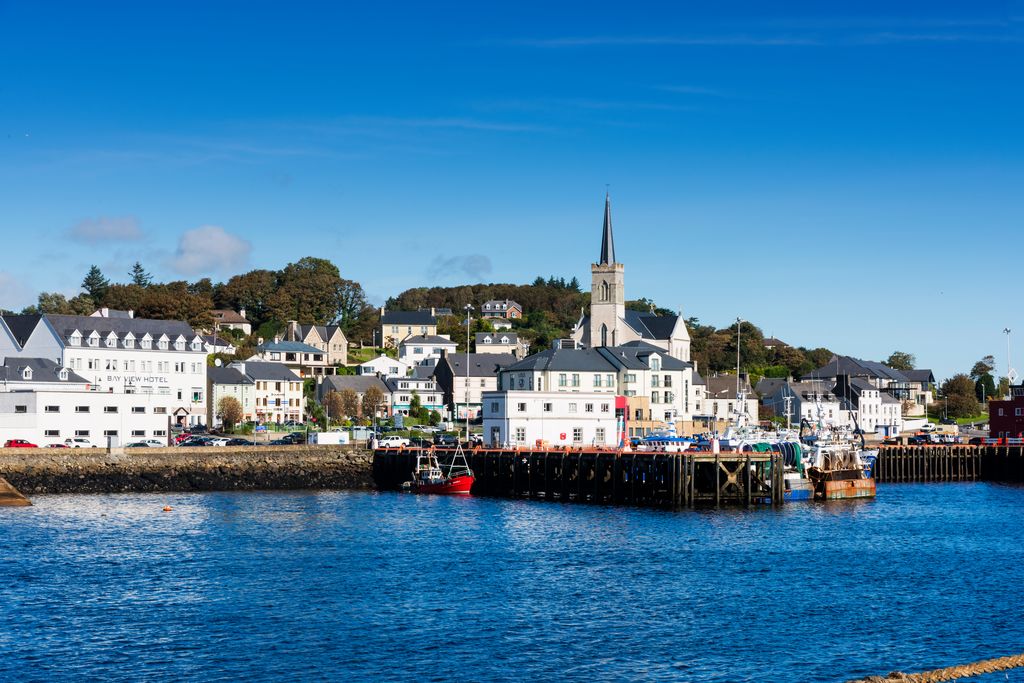
Killybegs overlooks Donegal Bay, across to the lighthouse at St John’s Point and onto the distinctive Ben Bulben mountain in Sligo. As Ireland’s number one fishing port, it has a profound connection to the ocean, and this is explained beautifully in the Maritime and Heritage Centre. At the mouth of the bay is Donegal Town, or Dhún na nGall (Irish), which translates as Fort of the Foreigners, referencing a time when Vikings made the town their stronghold. From Donegal Castle to the Franciscan Friary ruins, historical significance is everywhere. To see this pretty spot from the shores, hop onto the Donegal Bay Waterbus for gorgeous views of the Bluestack Mountains, Seal Island and the Bay itself.
If you have more time, book a table at Harvey's Point, which has been voted best hotel restaurant at the Irish Restaurant Awards. Or for something more casual, drop into the Harbour Restaurant or the Village Tavern. You've earned some real Donegal hospitality!





